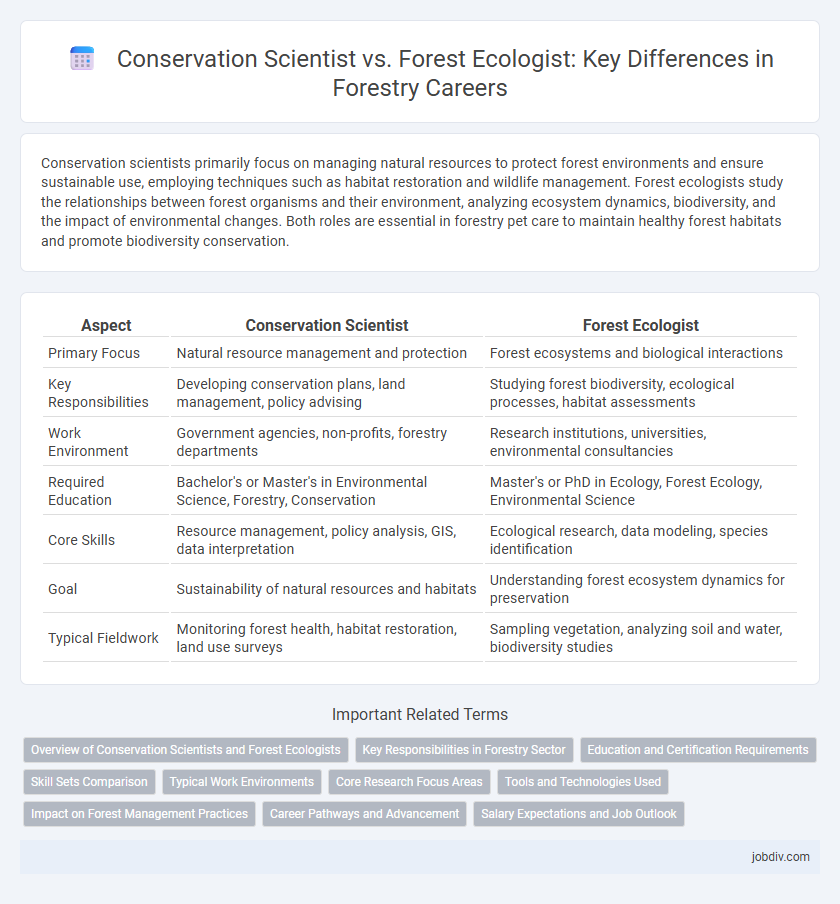Conservation scientists primarily focus on managing natural resources to protect forest environments and ensure sustainable use, employing techniques such as habitat restoration and wildlife management. Forest ecologists study the relationships between forest organisms and their environment, analyzing ecosystem dynamics, biodiversity, and the impact of environmental changes. Both roles are essential in forestry pet care to maintain healthy forest habitats and promote biodiversity conservation.
Table of Comparison
| Aspect | Conservation Scientist | Forest Ecologist |
|---|---|---|
| Primary Focus | Natural resource management and protection | Forest ecosystems and biological interactions |
| Key Responsibilities | Developing conservation plans, land management, policy advising | Studying forest biodiversity, ecological processes, habitat assessments |
| Work Environment | Government agencies, non-profits, forestry departments | Research institutions, universities, environmental consultancies |
| Required Education | Bachelor's or Master's in Environmental Science, Forestry, Conservation | Master's or PhD in Ecology, Forest Ecology, Environmental Science |
| Core Skills | Resource management, policy analysis, GIS, data interpretation | Ecological research, data modeling, species identification |
| Goal | Sustainability of natural resources and habitats | Understanding forest ecosystem dynamics for preservation |
| Typical Fieldwork | Monitoring forest health, habitat restoration, land use surveys | Sampling vegetation, analyzing soil and water, biodiversity studies |
Overview of Conservation Scientists and Forest Ecologists
Conservation scientists manage and protect natural resources by developing plans to prevent soil erosion, preserve wildlife habitats, and support sustainable land use, often working with landowners and government agencies. Forest ecologists study forest ecosystems' dynamics, focusing on interactions among plants, animals, and environmental processes to understand forest health and regeneration. Both professions contribute to environmental conservation but differ in their primary focus, with conservation scientists emphasizing resource management and forest ecologists prioritizing ecosystem research.
Key Responsibilities in Forestry Sector
Conservation Scientists primarily manage and protect forest resources by developing sustainable land use plans, conducting environmental impact assessments, and enforcing conservation policies to maintain biodiversity. Forest Ecologists focus on studying forest ecosystems, analyzing species interactions, and monitoring ecosystem health to understand ecological dynamics and support restoration efforts. Both roles collaborate to balance ecological integrity with resource utilization in the forestry sector.
Education and Certification Requirements
Conservation Scientists typically require a bachelor's degree in forestry, environmental science, or natural resources, with many employers preferring candidates who hold a master's degree and certifications such as the Society of American Foresters' Registered Professional Forester (RPF) credential. Forest Ecologists generally need advanced education, often a master's or doctoral degree in ecology, forestry, or environmental biology, with an emphasis on ecological research and fieldwork, and may pursue certifications in ecological restoration or GIS applications. Both careers value strong analytical skills and relevant internships or research experience to enhance job prospects and professional development.
Skill Sets Comparison
Conservation scientists possess expertise in natural resource management, environmental regulation compliance, and land-use planning, emphasizing habitat preservation and sustainable land practices. Forest ecologists specialize in analyzing forest ecosystems through skills in ecological modeling, species interaction assessment, and biodiversity monitoring to understand forest dynamics. Both roles require proficiency in Geographic Information Systems (GIS), field data collection, and environmental impact assessment, yet conservation scientists focus more on policy implementation while forest ecologists concentrate on ecosystem research.
Typical Work Environments
Conservation scientists primarily work in government agencies, environmental consulting firms, and non-profit organizations, conducting field assessments and managing land use to preserve natural resources. Forest ecologists are often based in research institutions, universities, and forestry departments, focusing on studying forest ecosystems, biodiversity, and ecological processes. Both roles involve extensive outdoor fieldwork but differ in their emphasis on applied land management versus scientific research and ecological monitoring.
Core Research Focus Areas
Conservation Scientists primarily focus on sustainable land management, protecting natural resources, and developing conservation plans to balance ecological, economic, and social needs. Forest Ecologists study forest ecosystems, biodiversity, and the interactions between plants, animals, and their environment, emphasizing ecosystem dynamics and environmental impact assessments. Both roles contribute to forest health, but Conservation Scientists prioritize applied resource management while Forest Ecologists concentrate on understanding ecological processes.
Tools and Technologies Used
Conservation scientists primarily use Geographic Information Systems (GIS), remote sensing technologies, and data analysis software to monitor land use, assess environmental impact, and develop sustainable management plans for forests. Forest ecologists employ tools such as dendrometers, soil sampling kits, and ecological modeling software to study forest structure, biodiversity, and ecological processes at various scales. Both professionals leverage advanced technologies like drones and satellite imagery to enhance data accuracy and inform conservation strategies.
Impact on Forest Management Practices
Conservation Scientists play a critical role in forest management by developing sustainable land use plans that balance ecological preservation with commercial timber production, ensuring long-term forest health. Forest Ecologists contribute by analyzing ecosystem dynamics, species interactions, and biodiversity patterns, providing scientific insights that inform adaptive management strategies to maintain forest resilience. Together, these professionals influence policies that prioritize habitat conservation, soil stability, and carbon sequestration, enhancing sustainable forestry practices.
Career Pathways and Advancement
Conservation Scientists primarily focus on managing natural resources and developing land use plans that promote sustainable forestry practices. Forest Ecologists conduct research on forest ecosystems, analyzing biodiversity, climate impact, and ecosystem health to inform conservation strategies. Career advancement for Conservation Scientists often involves roles in resource management and policy development, while Forest Ecologists typically progress toward research leadership and academic positions.
Salary Expectations and Job Outlook
Conservation Scientists earn an average salary of $65,000 to $85,000 annually, with growth driven by demand for sustainable land management and environmental compliance. Forest Ecologists typically command salaries ranging from $55,000 to $75,000, benefiting from increased research funding and ecological restoration projects. Job outlooks for both professions are positive, with Conservation Scientists experiencing a 5% growth rate and Forest Ecologists projected at 6%, reflecting expanding conservation efforts and climate change adaptation initiatives.
Conservation Scientist vs Forest Ecologist Infographic

 jobdiv.com
jobdiv.com